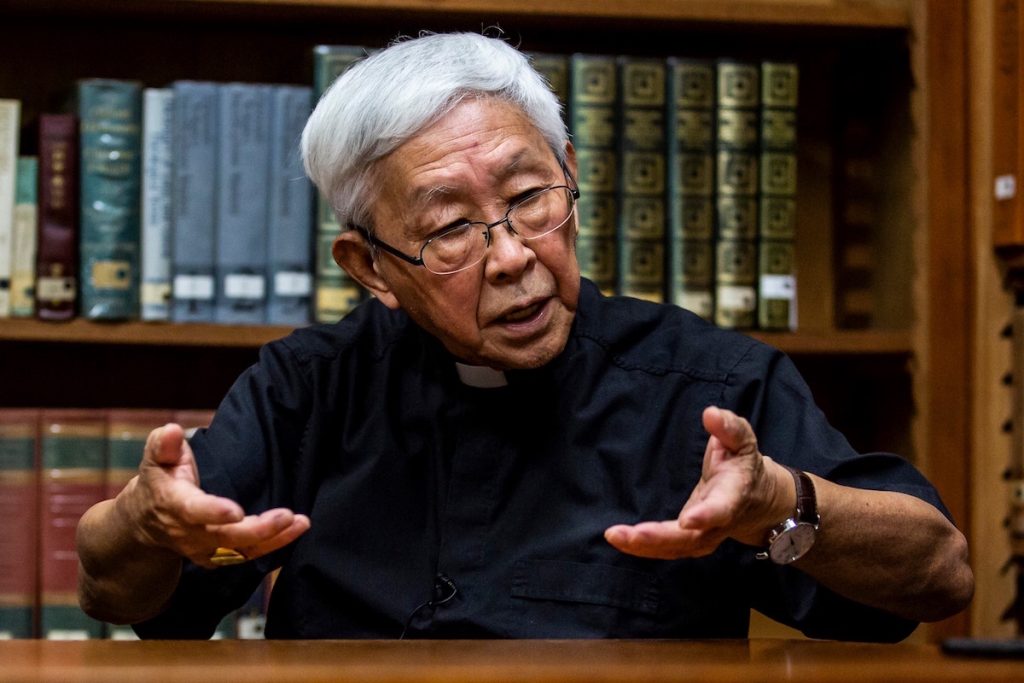Cardinal Joseph Zen, one of Asia’s highest-ranking Catholic Church leaders, will go on trial alongside four fellow democracy supporters on Monday over their role in running a fund to help defend people arrested in anti-government protests.
Cardinal Zen, 90, was originally detained earlier this year under a national security law that Beijing imposed on Hong Kong to quell dissent.
His arrest for “colluding with foreign forces” sent shock waves through the city’s Catholic community and renewed criticism of the Vatican’s warming ties with Beijing, including from fellow senior clerics.
Police have not yet charged Cardinal Zen with a national security offence, which can carry up to life in jail.
Instead, he and his fellow defendants, including activist and singer Denise Ho and veteran human rights barrister Margaret Ng, are being prosecuted for the less serious offence of failing to properly register their defence fund as a society.
If convicted they face a fine of up to HK$10,000 (US$1,274) but no jail time. All have pleaded not guilty.
None of the defendants spoke to reporters on their way into West Kowloon court on Monday morning.
Cardinal Zen had a walking stick and used his phone to scan a digital health code app that Hong Kong has used to grant access to public venues during the coronavirus pandemic.
The Vatican has been muted on Cardinal Zen’s arrest, saying it was concerned and “following the development of the situation very closely.”
Pope Francis declined to comment on Cardinal Zen’s arrest when asked about it earlier this month but said he was determined to continue pursuing a dialogue with Beijing.
Cardinal Zen’s prosecution comes at a sensitive time for the Vatican, which is working to renew its controversial agreement with Beijing later this year over the appointment of bishops in China.
Cardinal Zen was hugely critical, calling the deal a “sellout” of China’s underground Catholics who have faced persecution for remaining loyal to Rome and refusing to recognise Communist Party sanctioned Catholic Patriotic Association.


‘We abandoned him’
One of the most senior Catholic clerics to criticize the Vatican’s response to Zen’s arrest is German Cardinal Gerhard Mueller.
“We abandoned him,” Mueller told the Italian newspaper Il Messaggero earlier this month saying he was disappointed that a recent consistory — a gathering of cardinals in Rome — did not speak in support of Cardinal Zen.
“This cardinal will be sacrificed on the altar of reason, to defend and implement the diplomatic agreement with Beijing. I foresee this risk and I feel pain,” he added.
Cardinal Zen’s group acted as trustees of a now-defunct fund that helped pay legal and medical costs for those arrested during huge and sometimes violent democracy protests three years ago.
China responded to those protests with a sweeping crackdown on dissent.
A majority of the city’s most prominent democracy activists are now in jail or have fled overseas, while dozens of civil society groups have shuttered.
Some groups have been prosecuted for funding and registration irregularities, even though several had functioned without incident for years, including the alliance that used to organise the city’s annual Tiananmen crackdown vigils.
Hong Kong’s government says prosecutors are simply following the law.
Critics contend a form of “lawfare” has been launched to silence critical groups and bog them down in expensive legal fights.
Cardinal Zen’s “612 Humanitarian Relief Fund” is charged with not properly registering under the Societies Ordinance, a colonial-era law from 1911.
The fund disbanded after national security police demanded it hand over operational details including information about its donors and beneficiaries.
The investigation was triggered when one of the defendants, cultural studies scholar Hui Po-keung, was intercepted at Hong Kong’s airport on May 10 as he tried to leave to take up an academic post in Europe.


